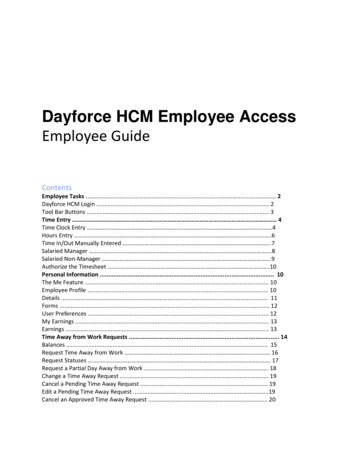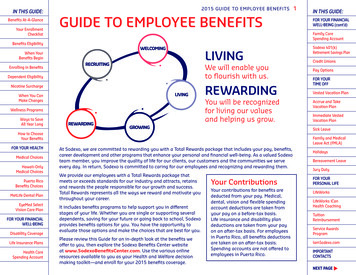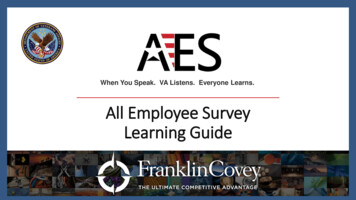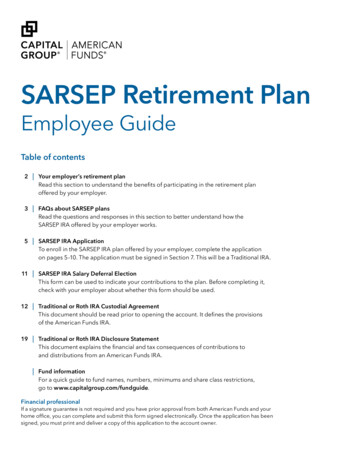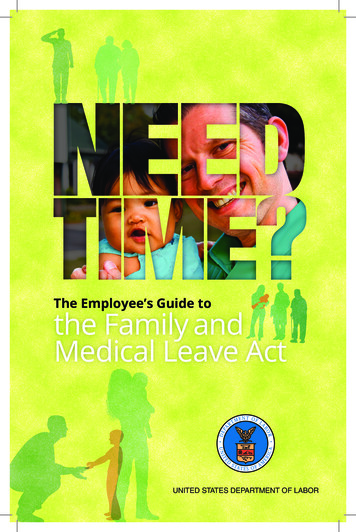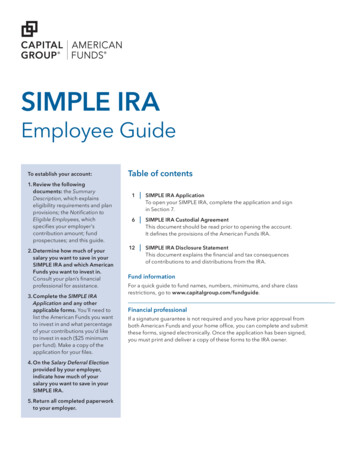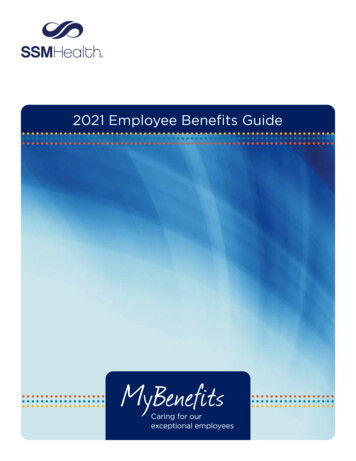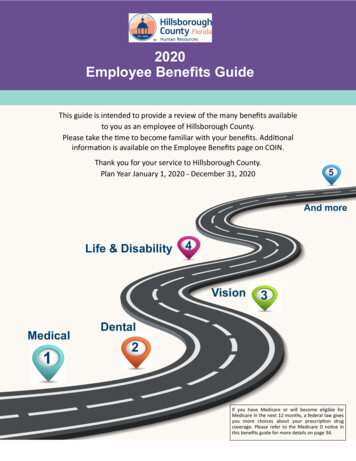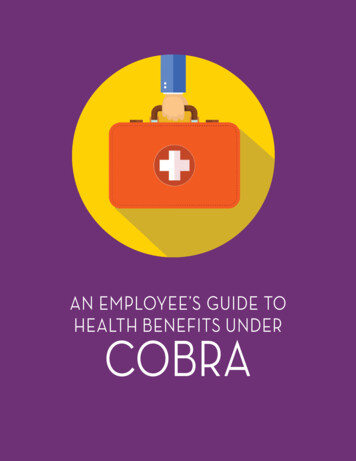
Transcription
AN EMPLOYEE’S GUIDE TOHEALTH BENEFITS UNDERCOBRA
This publication has been developed by the U.S. Department of Labor,Employee Benefits Security Administration (EBSA).To view this and other publications, visit the agency’s Website.To order publications, or to speak with a benefits advisor, contact EBSA electronically.Or call toll free: 1-866-444-3272This material will be made available in alternative formatto persons with disabilities upon request:Voice phone: (202) 693-8664TTY: (202) 501-3911This booklet constitutes a small entity compliance guide for purposes of theSmall Business Regulatory Enforcement Fairness Act of 1996.
ContentsIntroduction .1What is COBRA Continuation Coverage? .2Who Is Entitled to Continuation Coverage? .4COBRA Notice and Election Procedures .5Benefits Under Continuation Coverage .8Duration of Continuation Coverage .9Chart: Summary of Qualifying Events,Qualified Beneficiaries, andMaximum Periods of Continuation Coverage .11Paying for Continuation Coverage .12Coordination with Other Federal Benefit Laws .13Role of the Federal Government .14Resources .14
IntroductionA health plan helps workers and their families takecare of their essential medical needs. It is one ofthe most important benefits an employer canprovide.Under the Consolidated Omnibus Budget Reconciliation Act (COBRA),many employees and their families who would lose group health coveragebecause of serious life events can continue it in the employer’s group healthplan for a limited time, usually at their own expense.This booklet explains your rights under COBRA to a temporary extension ofemployer-provided group health coverage, called COBRA continuation coverage. It will: Provide a general explanation of your COBRA rights and responsibilities;Outline the COBRA rules that group health plans must follow;Highlight your rights while you are receiving COBRA continuation coverage.AN EMPLOYEE’S GUIDE TO HEALTH BENEFITS UNDER COBRA1
What Is COBRA Continuation Coverage?The Consolidated Omnibus Budget Reconciliation Act (COBRA) requires most group health plansto provide a temporary continuation of group health coverage that otherwise might be terminated.COBRA requires most group health plans to offer continuation coverage to covered employees, formeremployees, spouses, former spouses, and dependent children when group health coverage wouldotherwise be lost due to certain events. Those events include: A covered employee’s death,A covered employee’s job loss or reduction in hours for reasons other than gross misconduct,A covered employee’s becoming entitled to Medicare,A covered employee’s divorce or legal separation, andA child’s loss of dependent status (and therefore coverage) under the plan.Employers may require individuals who elect continuation coverage to pay the full cost of thecoverage, plus a 2 percent administration charge. The continuation coverage premium is often moreexpensive than the amount that active employees are required to pay because the employer usuallypays part of the cost of active employees’ coverage. COBRA continuation coverage lasts only for alimited period of time.COBRA generally applies to all group health plans maintained by private-sector employers with atleast 20 employees or by state and local governments. The law does not apply, however, to planssponsored by the federal government or by churches and certain church-related organizations. Manystates have laws similar to COBRA, including those that apply to health insurers of employerswith fewer than 20 employees (sometimes called mini-COBRA). Check with your state insurancecommissioner’s office to see if such coverage is available to you.Under COBRA, a group health plan is any arrangement that an employer establishes or maintains toprovide employees or their families with medical care, whether it is provided through insurance, by ahealth maintenance organization, out of the employer’s assets, or through any other means. “Medicalcare” includes for this purpose: Inpatient and outpatient hospital care,Physician care,Surgery and other major medical benefits,Prescription drugs, andDental and vision care.Life insurance and disability benefits are not considered “medical care.” COBRA does not cover plansthat provide only life insurance or disability benefits.COBRA-covered group health plans that are sponsored by private-sector employers generallyare governed by the Employee Retirement Income Security Act (ERISA). ERISA doesn’t requireemployers to have plans or to provide any particular type or level of benefits, but it does require plansto follow ERISA’s rules. ERISA also gives participants and beneficiaries legally enforceable rights.2UNITED STATES DEPARTMENT OF LABOR
Alternatives to COBRA Continuation CoverageIf you are entitled to elect COBRA continuation coverage, you should consider all options before youmake your decision. There may be more affordable or generous health coverage options for you andyour family through other group health plan coverage (such as a spouse’s plan), the Health InsuranceMarketplace, Medicare, Medicaid, or short-term, limited-duration insurance.Under the Health Insurance Portability and Accountability Act (HIPAA), if you or your dependentslose eligibility for group health coverage, including continuation coverage, you may be able to specialenroll in other group health coverage without waiting until the next open season. For example, anemployee who loses group health coverage may be able to special enroll in a spouse’s plan, or adependent who loses eligibility for group health coverage may be able to enroll in a different parent’splan. To have a special enrollment opportunity, you or your dependent must have been previouslyeligible for the plan in which you now want to enroll and had other health coverage when that plan wasfirst offered to you. You must request special enrollment within 30 days of losing other coverage.Losing your job-based health coverage also gives you an opportunity to enroll in the Health InsuranceMarketplace. The Marketplace allows you to find and compare private health insurance options.Through the Marketplace, you may qualify for a tax credit that lowers your monthly premiums andcost-sharing reductions to your deductibles, coinsurance, and copayments.Being offered COBRA continuation coverage doesn’t limit your eligibility for Marketplace coverage orfor a tax credit. You can apply for Marketplace coverage at HealthCare.gov or by calling 1-800-3182596 (TTY 1-855-889-4325). To special enroll in a Marketplace plan, you must select a plan within60 days before or after losing your job-based coverage. In addition, anyone can enroll in Marketplacecoverage during an open enrollment period. If you need health coverage in the time between losing yourjob-based coverage and beginning coverage through the Marketplace (for example, if you or a familymember needs medical care), you may wish to elect COBRA coverage from your former employer’splan. You then will have health coverage until the Marketplace coverage begins.Through the Marketplace, you can also learn if you qualify for free or low-cost coverage fromMedicaid or the Children’s Health Insurance Program (CHIP). You can apply for and enroll inMedicaid and CHIP at any time. If you qualify, your coverage begins immediately. Visit HealthCare.govor call 1-800-318-2596 (TTY 1-855-889-4325) for more information or to apply for these programs.You can also apply for Medicaid by contacting your state Medicaid office and learn more about yourstate’s CHIP program by calling 1-877-KIDS NOW (543-7669) or visiting InsureKidsNow.gov.If you or your dependent elects COBRA continuation coverage, you can request special enrollment inanother group health plan or a Marketplace plan if you have a new special enrollment event, such asmarriage, the birth of a child, or if you exhaust your COBRA coverage. To exhaust COBRA coverage,you or your dependent must receive the maximum period of COBRA coverage available without earlytermination. Keep in mind if you choose to terminate your COBRA coverage early with no specialenrollment opportunity at that time, you will have to wait until the next open enrollment period toenroll in coverage through another group health plan or the Marketplace.As an alternative to coverage through the Marketplace, you may also have the option of purchasingshort-term, limited-duration insurance. In general, short-term, limited-duration insurance is a type ofhealth insurance coverage that’s primarily designed to fill gaps in coverage that may occur when anindividual is transitioning from one coverage to another, such as when a person is in between jobs.This type of insurance may not be suitable coverage for all circumstances. It may not provide coveragethat is as comprehensive as individual health insurance. This type of coverage may be less expensiveAN EMPLOYEE’S GUIDE TO HEALTH BENEFITS UNDER COBRA3
than traditional insurance and is exempt from federal requirements governing traditional insurance.Because this type of insurance is generally subject to state regulation, coverage and availability willvary by state. Some states have regulations limiting the availability of this type of insurance. There arealso states requiring coverage using the Affordable Care Act’s essential health benefits requirement.If interested in this type of insurance, learn more about your state’s regulation at the NationalAssociation of Insurance Commissioners’ Website.Medicare is the federal health insurance program for people who are 65 or older and certain youngerpeople with disabilities or End-Stage Renal Disease. Generally, if you lose your job after yourMedicare initial enrollment period and did not enroll in Medicare Part A or B, you have an 8-monthspecial enrollment period, beginning the earlier of: The month after your employment ends; orThe month after your group health coverage ends.If you elect COBRA coverage instead of Medicare, you may have to pay a late enrollment penalty andmay have a gap in coverage if you later decide you want Part B. If you enroll in Medicare Part A or Bbefore your COBRA coverage ends, your plan may terminate your continuation coverage. However,if Medicare Part A or B is effective on or before the date you elect COBRA, your plan cannotdiscontinue your COBRA coverage because of Medicare entitlement even if you enroll in the otherpart of Medicare after you elect COBRA coverage.Generally, if you are enrolled in both COBRA and Medicare, Medicare will be the primary payer andCOBRA coverage will pay second. Certain plans may pay as if secondary to Medicare, even if you are notenrolled in Medicare. For more information visit Medicare’s Website.Who Is Entitled to Continuation Coverage?You must meet three basic requirements to be entitled to elect COBRA continuation coverage: Your group health plan must be covered by COBRA;A qualifying event must occur; andYou must be a qualified beneficiary for that event.Plan CoverageCOBRA covers group health plans sponsored by an employer (private-sector or state/localgovernment) that had at least 20 employees on more than 50 percent of its typical business days inthe previous calendar year. Both full- and part-time employees are counted to determine whether aplan is subject to COBRA. Each part-time employee counts as a fraction of a full-time employee, withthe fraction equal to the number of hours worked divided by the hours an employee must work to beconsidered full-time. For example, if full-time employees at Company A work 40 hours per week, apart-time employee who works 20 hours per week counts as half of a full-time employee, and a parttime worker who works 16 hours per week counts as four-tenths of a full-time employee.Qualifying Events“Qualifying events” are events that cause an individual to lose group health coverage. The type ofqualifying event determines who the qualified beneficiaries are and the period of time that a plan mustoffer continuation coverage. COBRA establishes only the minimum requirements for continuation4UNITED STATES DEPARTMENT OF LABOR
coverage. A plan may always choose to provide longer periods of continuation coverage and/or tocontribute toward the cost.The following are qualifying events for a covered employee if they cause the covered employee tolose coverage: Termination of the covered employee’s employment for any reason other than “grossmisconduct,” orReduction in the covered employee’s hours of employment.The following are qualifying events for a spouse and dependent child of a covered employee if theycause the spouse or dependent child to lose coverage: Termination of the covered employee’s employment for any reason other than “grossmisconduct,”Reduction in hours worked by the covered employee,Covered employee becomes entitled to Medicare,Divorce or legal separation from the covered employee, orDeath of the covered employee.In addition to the above, the following is a qualifying event for a dependent child of a coveredemployee if it causes the child to lose coverage: Loss of “dependent child” status under the plan rules. Under the Affordable Care Act, plansthat offer coverage to children on their parents’ plan must make the coverage available until thechild reaches the age of 26.Qualified BeneficiariesA qualified beneficiary is an employee who was covered by a group health plan on the day before aqualifying event occurred or that employee’s spouse, former spouse, or dependent child. Only certainindividuals can become qualified beneficiaries due to a qualifying event, and the type of qualifyingevent determines who can become a qualified beneficiary when it happens. A qualified beneficiarymust be a covered employee, the employee’s spouse or former spouse, or the employee’s dependentchild. In certain cases involving employer bankruptcy, a retired employee and their spouse, formerspouse, or dependent children may be qualified beneficiaries. In addition, any child born to or placedfor adoption with a covered employee during a period of continuation coverage is automaticallyconsidered a qualified beneficiary. An employer’s agents, independent contractors, and directors whoparticipate in the group health plan may also be qualified beneficiaries.COBRA Notice and Election ProceduresUnder COBRA, group health plans must provide covered employees and their families withspecific notices explaining their COBRA rights. Plans must also have procedures for how COBRAcontinuation coverage is offered, how qualified beneficiaries may elect continuation coverage, andwhen it can be terminated.AN EMPLOYEE’S GUIDE TO HEALTH BENEFITS UNDER COBRA5
Notice ProceduresSummary Plan DescriptionThe COBRA rights provided under the plan must be described in the plan’s Summary PlanDescription (SPD). The SPD is a written document that gives important information about the plan,including what benefits are available under the plan, the rights of participants and beneficiaries underthe plan, and how the plan works. ERISA requires group health plans to give you an SPD within 90days after you become a plan participant (or within 120 days after the plan is first subject to ERISA’sreporting and disclosure provisions). In addition, if there are material changes to the plan, the planmust give you a Summary of Material Modifications (SMM) not later than 210 days after the end ofthe plan year in which the changes become effective. If the change is a material reduction in coveredservices or benefits, the plan administrator must furnish the SMM within 60 days after the reductionis adopted. If a covered participant or beneficiary requests in writing a copy of these or any other plandocuments, the plan administrator must provide them within 30 days.COBRA General NoticeGroup health plans must give each employee and spouse a general notice describing COBRA rightswithin the first 90 days of coverage. Group health plans can satisfy this requirement by including thegeneral notice in the plan’s SPD and giving it to you and your spouse within this time limit.The general notice must include: The name of the plan and the name, address, and telephone number of someone you cancontact for more information on COBRA and the plan;A general description of the continuation coverage provided under the plan, andAn explanation of what you must do to notify the plan of qualifying events or disabilities.COBRA Qualifying Event NoticeA group health plan must offer continuation coverage if a qualifying event occurs. The employer,employee or beneficiary must notify the group health plan of the qualifying event, and the plan is notrequired to act until it receives an appropriate notice. Who must give notice depends on the type ofqualifying event.The employer must notify the plan if the qualifying event is: Termination or reduction in hours of employment of the covered employee,Death of the covered employee,Covered employee becoming entitled to Medicare, orEmployer bankruptcy.The employer must notify the plan within 30 days after the event occurs.You (the covered employee or one of the qualified beneficiaries) must notify the plan if the qualifying event is: Divorce,Legal separation, orA child’s loss of dependent status under the plan.You should understand your plan’s rules for how to provide notice if one of these qualifying eventsoccurs. Group health plans must have procedures in both the general notice and the SPD for how youcan provide notice of these types of qualifying events. The plan can set a time limit for providing thisnotice, but the time limit cannot be shorter than 60 days, starting from the latest of:6UNITED STATES DEPARTMENT OF LABOR
The date the qualifying event occurs,The date you lose (or would lose) coverage under the plan as a result of the qualifying event, orThe date you are informed, through the furnishing of either the SPD or the COBRA generalnotice, of the responsibility to notify the plan and the procedures for doing so.If your plan does not have reasonable procedures for how to give notice of a qualifying event, you cangive notice by contacting the person or unit that handles your employer’s employee benefits matters.If your plan is a multiemployer plan, notice can also be given to the joint board of trustees, and, if theplan is administered by an insurance company (or the benefits are provided through insurance), noticecan be given to the insurance company.COBRA Election NoticeAfter receiving a notice of a qualifying event, the plan must provide the qualified beneficiaries with anelection notice within 14 days. The election notice describes their rights to continuation coverage andhow to make an election. The notice should contain all of the information you will need to understandcontinuation coverage and make an informed decision whether or not to elect it. The notice also shouldprovide the name of the plan’s COBRA administrator and tell you how to get more information.COBRA Notice of Unavailability of Continuation CoverageGroup health plans may sometimes deny a request for continuation coverage or for an extensionof continuation coverage. When a plan denies your or any member of your family’s request forcontinuation coverage or request for an extension, the plan must give you or your family membera notice of unavailability of continuation coverage within 14 days after the request is received andexplain the reason for denying the request.COBRA Notice of Ear
Employee Benefits Security Administration (EBSA). To view this and other publications, visit the agency’s . Website. To order publications, or to speak with a benefits advisor, contact EBSA . electronically. Or call toll free: 1-866-444-3272. This material will be made available in alterna
